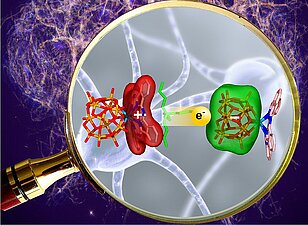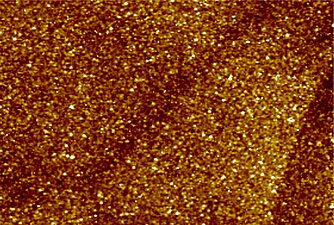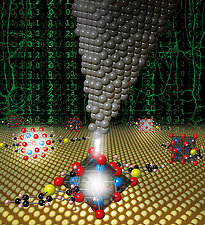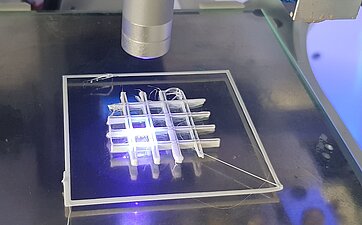The research group “Switchable molecularly functionalized surfaces” develops innovative hybrid surfaces consisting of redox- and spin-active molecular compounds immobilized as single molecules or thin films on technical material systems. These next-generation surfaces should provide new functions for data storage and processing (integration of semiconductor technology with molecular chemistry and physics) or can be used as chemosensors in diagnostics. The research focuses on the stability, sensory efficiency, and electrical performance of molecular logic states of metal complexes on conducting and semiconducting surfaces as bottom electrodes and their manipulation by the tip of a scanning probe microscope as the top electrode. The goal is to introduce stimuli-responsive, functional materials into industrial applications in the areas of digital transformation, green-IT, as well as therapy and diagnostics in medicine. This will be achieved through a deep scientific understanding of hybrid surfaces.

Team
PostDocs
Dr. Marco Moors
+49 (0)341 235-3286
marco.moors(a)iom-leipzig.deDr. Stanislav Petrovskii
+49 (0)341 235-3363
stanislav.petrovskii(a)iom-leipzig.deDr. Alina Petrovskaia
+49 (0)341 235-3364
alina.petrovskaia(at)iom-leipzig.deDr. Benedikt Bagemihl
+49 (0)341 235-2593
benedikt.bagemihl(at)iom-leipzig.dePhDs
Eric Vogelsberg
+49 (0)341 235-3286
eric.vogelsberg(a)iom-leipzig.deJonas Lorenz
+49 (0)341 235-3363
jonas.lorenz(a)iom-leipzig.deAlumni
Dr. Sebastian Schmitz
Dr. Irina Werner
Dr. Fangshun Yang
Dr. Maria Glöß
Expertise
- Synthesis and organic derivatization of non-classical metal oxides
- Synthesis and organic derivatization of multimetallic coordination compounds
- Generation of biocompatible nanosystems
- Electrochemical investigations
- Surface preparation using wet-chemical and vacuum-based methods
- Ultra-high vacuum technology and scanning probe microscopy
- Potential-induced switching of molecular systems on surfaces
Projects
DFG - Priority Programme
2024 – 2028
HHybrid memristive device with multilevel-modulated electrical conductance of interfaced atomically thin 2D materials and molecular oxidesDFG - Collaborative Research Centre
2023 – 2027
Suppressing nuclear spin relaxation by light-driven switching of multi-spin DNP agentsBoehringer Ingelheim Foundation - Exploration Grant
2021
Bioinspired “DNA–Polyoxometalate-on-a-Surface” Materials for Nanoelectronic ApplicationsLeibniz Association - Leibniz Collaborative Excellence Funding Programme
2020-2023
Design and Control of Patterned Large-Area Molecule–Surface Interfaces for Multiple-State Data Storage TechnologiesDFG - Individual Research Grants
2020-2023
Phthalocyaninato Transition Metal / Lanthanide-Supported Polyoxometalate Complexes for the Study of Large-Area Molecular Charge Transport Properties2022-2025
Photo-Induced Multiple-State Switching of Polyoxometalate-Chromophore Hybrid Compounds: Charge- vs. Resistive-based Data StorageDFG - Emmy Noether Programme
2015-2021
Development of Heteropolyvanadate Spin Clusters as Candidates for Future Redox-Based Memory Devices
Research Networks
Partners
- MemrisTec Memristive Devices Toward Smart Technical Systems (DFG SPP 2262)
- HYP*MOL Hyperpolarization in molecular systems (DFG CRC/TRR 386)
- IRN-POM Smart Molecular Oxides (CNRS)
- G-RISC German-Russian Interdisciplinary Science Center (DAAD)
- International Younger Chemists Network (IYCN) / Mentoring




